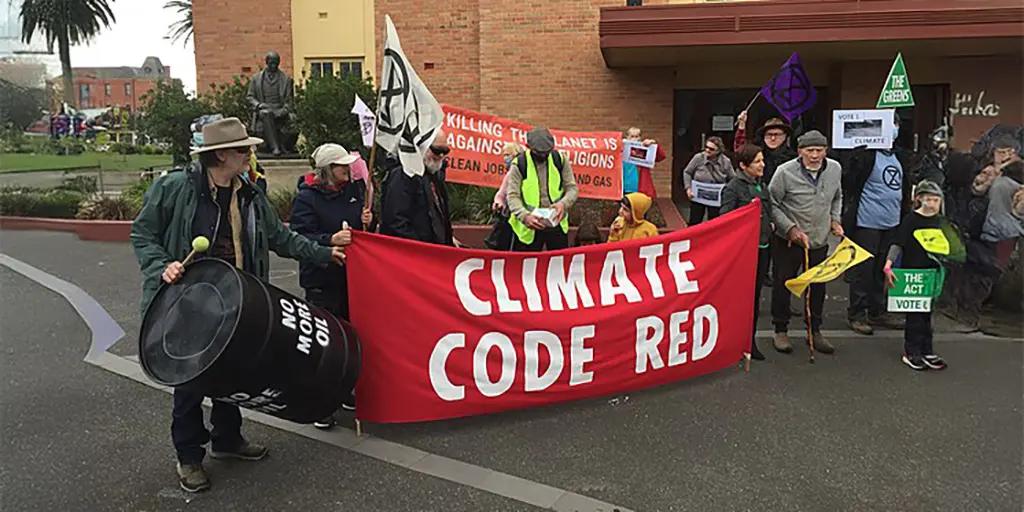Ted Nordhaus deserves credit for doing what few in the climate establishment do: admitting he was wrong. in his essay “I thought climate change would end the world. I made a mistake” (The Free Press, October 19, 2025), Nordhaus admits that his worldview “was based on apocalyptic models born of erroneous assumptions.” That phrase alone marks a defining moment in the long, strange saga of climate alarmism. It is rare to see one of the movement’s own architects confess that its foundations were exaggerated, its projections implausible, and its tone hysterical.
Nordhaus co-founded the Breakthrough Institute, an organization that has long tried to make climate activism seem reasonable by combining environmental rhetoric with talk of innovation and modernization. For years, he and his colleagues accepted the central dogma: that the planet would face an existential crisis unless humanity quickly abandoned fossil fuels. They were not content to question science; They amplified it. “Earth warming,” Nordhaus once wrote in 2007, “will cause sea levels to rise and the Amazon to collapse and… trigger a series of wars over basic resources like food and water.”
Now, almost two decades later, he confesses that such scenarios were never plausible. The old models assumed “high population growth, high economic growth and slow technological change,” a trifecta of contradictions that cannot coexist. He notes that fertility rates are falling, economies are decarbonizing on their own, and technological progress is accelerating efficiency regardless of political slogans. His admission is blunt: “I no longer believe in this hyperbole.”
That’s refreshing honesty.
Even more notable is Nordhaus’s recognition that so-called “worst-case” scenarios—those beloved of headliners and politicians—have been quietly revised downward. “Most estimates of the worst warming by the end of the century now suggest three degrees or less,” he writes, but “the reaction of much of the climate science and advocacy community has not been to become less catastrophic.” Instead, the doomsday clock has simply been reset. The goalposts move, but the panic persists.
It is a classic characteristic of ideological systems: when the facts soften, the rhetoric hardens.
Nordhaus even points to the extraordinary decline (more than 96 percent) in global mortality due to climate and extreme weather events over the past century. Despite the supposed “age of extremes,” fewer and fewer people are dying from heat, cold, storms or floods. The world, far from teetering on the brink of climate apocalypse, is enjoying the safest and most technologically protected era in history. However, as you note, this reality has not penetrated the climate advocacy bubble.
He credits Roger Pielke Jr. for showing that, once normalized in terms of wealth and population, disaster losses have increased. No increased with warming. In other words, the catastrophe narrative fails its own empirical test. Nordhaus admits that the data “overwhelms the climate signal,” because what determines the cost of disasters is not just the climate, but also how rich, prepared and well-built societies are.
This is where Nordhaus shines: his understanding that risk is a function of vulnerability, not temperature. A rich city can withstand what would devastate a poor one. A stronger economy produces better infrastructure, medicines and recovery systems. And that, of course, is the irony of climate alarmism: the same economic growth that activists denounce is what protects humanity from the dangers of nature.
And it goes even further, dismantling the myth of the “accelerating catastrophe.” He notes that even in cases where warming could be slightly greater than expected, “the additional anthropogenic warming is an order of magnitude smaller than the oscillations of natural variability.” That line should be etched on the lintel of every climate ministry on Earth. However, it won’t be. For once it is admitted that natural variation overwhelms human influence, the arguments for massive social reorganization collapse.
Nordhaus acknowledges what skeptics have been saying for decades: “Climate change contributes very little to today’s disasters.” Even if one contemplates “worst-case scenarios,” the results “are not even remotely consistent with the kind of catastrophic outcomes I once believed in.”
At this point one hopes that he will throw away the last vestiges of faith. But Nordhaus, to his credit and perhaps to his lingering faith, does not. He remains a supporter of the idea that anthropogenic warming is real, if modest; that cleaner technologies are desirable; and that innovation can be good policy. In that sense, he is a reformer, not a heretic. He has left the cathedral, but still genuflects at its door.
Still, his recognition of the intellectual corruption of the movement is devastating. He writes that “there are strong incentives to overestimate climate risk if one makes a living doing center-left climate and energy policies.” The system rewards conformity. Academics, think tanks, foundation officials, and congressional staff each depend on maintaining the “existential threat” narrative. Without that, the money runs out.
He calls it what it is: “The climate movement has effectively combined consensus science about the reality and anthropogenic origins of climate change with catastrophic claims about climate risk, for which there is no consensus.” That distinction between modest warming and apocalypse is the same distinction that has been erased from public debate.
Nordhaus is right again when he identifies the sociological roots of this hysteria. He cites research showing that highly educated people are further prone to making mistakes when events threaten their political identities. In other words, the smarter you are, the easier it will be for you to rationalize your ideology. It’s a dangerous cocktail: intelligence mixed with conformity.
It also points to the idea that fear is necessary to stimulate innovation. “There is no evidence,” he writes, “that 35 years of increasingly dire rhetoric… has had any effect on the rate at which the global energy system has decarbonized.” In fact, the planet decarbonized faster before Climate change became a cause célèbre. This is a surprising admission from one of the movement’s intellectuals. If sermons do not accelerate progress, what good is religion?
Nordhaus’s response is uncomfortable but true: the climate establishment “is actually looking for something different… a rapid and complete reorganization of the global energy economy.” Not a modest improvement: a revolution. And, as he admits, “there is no good reason to do so without the specter of catastrophic climate change.”
This is where Nordhaus hits the third rail: the political motive. For decades, climate rhetoric has served as scaffolding for a central control agenda. What began as an environmental concern transformed into a technocratic movement bent on redesigning civilization. Nordhaus’s essay exposes the psychological and institutional drivers of that impulse, even if it does not entirely condemn them.
To his credit, he also notes that this culture of hype and moral panic has made the movement “profoundly out of touch with popular sentiment.” You could say that the public has already done its own cost-benefit analysis and found the apocalypse unconvincing. Ordinary citizens feel what Nordhaus now admits: the climate “crisis” is a projection, not a prediction.
Eric’s post yesterday traced the same arc: from belief to realism. Nordhaus adds intellectual meat to that skeleton. Nordhaus reveals his sociology: how the right credentials and the right funding streams can blind even smart people to basic empirical truth.
In some ways, Nordhaus’s journey mirrors that of many early believers who mistook model results for observations and confused correlation with causation. However, his willingness to reexamine the evidence (and publicly say he was wrong) marks a break with the culture of consensus that has long punished dissent.
There is still some theology in it; After all, he is still an “ecomodernist,” which is just a secular way of saying “green but not crazy.” But his essay is a major crack in the facade. He has turned his back on the catastrophe, and that is no small act of bravery in a world where even measured skepticism gets one excommunicated.
For this, Ted Nordhaus deserves genuine respect. He may not yet be a total skeptic, but he has done something rare in the climate priesthood: he has confessed that the prophecies were false.
And maybe, in time, you’ll realize that the real danger was never the weather. It was the arrogance of those who thought they could control him.
Find out more from Watts Up With That?
Subscribe to receive the latest posts in your email.
#Ted #Nordhaus #Epiphany #Watts #agree










